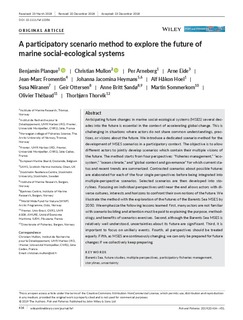| dc.description.abstract | Anticipating future changes in marine social‐ecological systems (MSES) several decades into the future is essential in the context of accelerating global change. This is challenging in situations where actors do not share common understandings, practices, or visions about the future. We introduce a dedicated scenario method for the development of MSES scenarios in a participatory context. The objective is to allow different actors to jointly develop scenarios which contain their multiple visions of the future. The method starts from four perspectives: “fisheries management,” “ecosystem,” “ocean climate,” and “global context and governance” for which current status and recent trends are summarized. Contrasted scenarios about possible futures are elaborated for each of the four single perspectives before being integrated into multiple‐perspective scenarios. Selected scenarios are then developed into storylines. Focusing on individual perspectives until near the end allows actors with diverse cultures, interests and horizons to confront their own notions of the future. We illustrate the method with the exploration of the futures of the Barents Sea MSES by 2050. We emphasize the following lessons learned: first, many actors are not familiar with scenario building and attention must be paid to explaining the purpose, methodology, and benefits of scenarios exercises. Second, although the Barents Sea MSES is relatively well understood, uncertainties about its future are significant. Third, it is important to focus on unlikely events. Fourth, all perspectives should be treated equally. Fifth, as MSES are continuously changing, we can only be prepared for future changes if we collectively keep preparing. | nb_NO |
